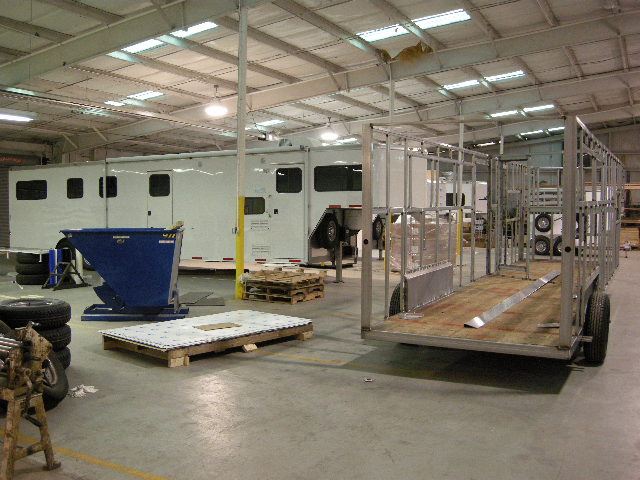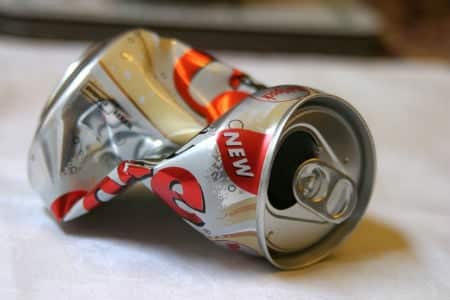Is Your Trailer to Tow Vehicle “Weight Ratio” Safe for the Road?
 Within the horse trailer industry, there is a strong belief that “lighter is better.” It’s one reason why all-aluminum horse trailers have gained so much popularity in recent decades.
Within the horse trailer industry, there is a strong belief that “lighter is better.” It’s one reason why all-aluminum horse trailers have gained so much popularity in recent decades.
But recently, we’ve made some great advancements in horse trailer construction technology. Now we can build both lightweight and strong trailers that outperform all-aluminum trailers across the board.
In this article, we’re going to take a closer look at what “lightweight” means in today’s world of horse trailers. We’ll also outline some safety guidelines to make sure your trailer to tow vehicle “weight ratio” is within safe standards.
Aluminum Horse Trailers Aren’t the Only Lightweights Out There
One of the top things our new customers want is a trailer that is both lightweight and strong. Our unique Z-Frame design easily fits the bill. This patented technology is used to create the chassis (frame) and interior dividers on all Double D Trailers. Z-Frame material is impregnated with zinc and chromium so it is as light as aluminum and as strong as steel.
Many of our customers find Z-Frame to be a much better option over all-aluminum trailers, which have been shown to have poor crash test ratings.
Still, many people in the industry have this idea stuck in their heads that “aluminum is still better because it’s more lightweight.”
Brad Heath, owner of Double D Trailers took some time to dive into the numbers when comparing the trailer weights of the five main types of horse trailers:
- Z-Frame Trailer with Galvalite Skin from Double D Trailers
- All-Aluminum Horse Trailers (Aluminum frame and skin)
- All-Steel Horse Trailers (Steel frame and skin)
- Steel Frame with Aluminum Skin
- Steel Frame with Rust-Resistant Galvaneal Skin
He explained, “A single wall, steel frame, Galvaneal skin trailer will weigh within 10% of the same weight as a well-constructed aluminum trailer.”
Brad continued, “A steel frame, double walled, aluminum skin trailer will also weigh within 10% of a well-constructed all aluminum trailer. In fact, most of the comparisons we've done there was less than 5% difference in the weight.”

For all of these comparisons, the keyword to notice is “well-constructed.” If an aluminum trailer is significantly lighter than any of these options, it doesn’t mean it’s a good thing. Instead, it means the aluminum trailer manufacturer used a much thinner material for the framework -- which is a significant safety hazard.
Anytime a poorly built aluminum trailer material is put under stress from a horse, there is a risk for that material to bend or even tear into sharp edges. This could happen if a horse gets a leg over the divider or rears into a trailer wall.
So, the theory in the industry that all steel is “heavy” and all aluminum is “light” is only a myth. The weight scales indicate otherwise. There is plenty of technology to make a lightweight and strong trailer that is not all-aluminum.
A “Lighter” Horse Trailer is Not Always Better
This topic is important because the weight of your trailer is going to influence the type of tow vehicle you need to haul your load.
“The problem I see in the industry in regards to towing are companies that use thin all-aluminum materials or things like fiberglass shells in an effort to make an extremely lightweight trailer,” Brad explained.
The unsuspecting buyer hears how “light” a trailer is and how “easy” it is to tow – they fall for this story and end up buying an unsafe trailer. Their new trailer is fine for a time until something goes wrong and the thin lightweight materials are put to the test. That’s when a dangerous failure occurs.
Think of it this way… if you have a light trailer that only weighs 2500 lbs and it’s hauling 2,000 lbs worth of horses (4,500 lbs total)… being towed behind a small tow vehicle – like an SUV -- that weights 4,000 lbs… you have an accident waiting to happen.
It’s basic physics.
To fix this weight ratio issue, the solution is to purchase a larger tow vehicle and a trailer that is more in line with the weight of the horses being hauled.
The majority of the Double D Trailers we build in a 2 horse bumper pull weigh between 3,800 and 4,000 lbs depending on the layout. So, in this case, towing 2,000 lbs of horse in a 4,000 lb trailer makes more sense and is much safer.
How to Judge Your Trailer to Tow Vehicle “Weight Ratio”
To put this in the simplest terms, we’ve created a few rules to help you decide if your horse trailer to tow vehicle weight ratio is in line with safe standards.
1st – The weight of your horse trailer should weight around double the weight of the horses combined weight.
For example, our SafeTack Reverse 2 Horse Bumper Pull trailer ends up weighing around 4,000 lbs, so hauling 2,000 lbs worth of horses seems reasonable.
Anything that’s “lighter” means it’s built “thinner.” When compromised or stressed, this type of trailer isn’t going to be safe.

If we had a 2 horse bumper pull trailer weighing 6,000 lbs (4,000 lbs trailer + 2,000 lbs horses), the vehicle should weigh around 80% or more of the load being hauled. For example, a Ford F150 truck will weigh around 5,500 lbs depending on the specs and would be in the safe zone for this trailer (provided the tow vehicle is properly equipped.)
“Once you jump to a 3 horse trailer or go with a gooseneck, the parameters would change,” Brad explained. “However, for a two horse bumper pull in particular, the numbers outlined above I think are bare minimum for safety. Outside of those ratios and you are asking for trouble.”
Check out our Towing Guides for that latest tow vehicle stats. And if you have any questions for Brad, feel free to contact him here.

